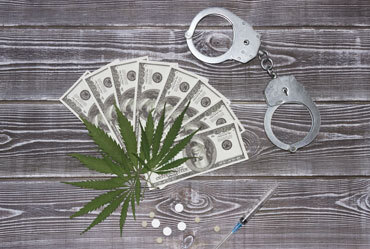Search

Why I am being charged with Marijuana Possession when the substance is legal in my state? Unlike many state legislatures of the recent years, the US Congress has not legalized possession of marijuana. However, marijuana possession is still an offense in federal court is punishable by jail time. Similarly, under federal law, do prescribe it for medical purposes is prohibited for doctors. Schedule is a system used in Federal law that sorts drugs depending on whether or not they have a legitimate medical purpose, their propensity for being abused, possibility of use under proper supervision and their relation to dependance. The greater the risk that a substance poses according to these criteria, the higher its numerical schedule designation. The most hazardous substance is schedule I drugs. Despite the fact that the majority of citizens does not consider marijuana to be a dangerous drug, it is stated to be Schedule I under federal law. The sanctions that might be given out for some federal crimes involving marijuana do not necessarily have to be mild as most people can easily imagine.
In federal court, the possession of marijuana to be a class A Misdemeanor- is subjected to be penalized with up to one year’s imprisonment, and fined up to $1000 where it’s the first offense. Consecutive drug convictions involving marijuana are felonies that attract the mandatory minimum jail term. To be second convicted, there is a minimum jail term of 15 days and a maximum of two years. The extent of fine also rises to $2,500. If it is the third or subsequent time the offender was convicted of DUI, it may become a felony; It must have a mandatory minimum of 90 days imprisonment and the maximum of up to three years imprisonment. The changes made to the Act also added years to the maximum prison term and raised the fine to $5,000.
Illicit possession may be actual or constructive: It is actual or ‘open’ possession as when the marijuana was discovered in the pocket of the accused. However, it also includes constructive possession which may be established if the drug was within the defendant’s control area and the defendant was aware or should reasonably have been aware of the existence of the drugs.
Even where such a person is not charged with a criminal wrongfulness for marijuana possession, he or she could be subjected to a civil fine of up to $10,000 and the government may make the individual to compensate it for the costs of investigation and prosecution.
A first-time offender, who has been given a misdemeanor marijuana possession charge, may qualify for a deferred disposition. The profession must not have any record of any other state or federal drug convictions and the person must not have any other deferred disposition. In this program, the defendant pleads or is found guilty and upon conviction, the court does not formally file the record thereof. Where the defendant has been put on probation for one year, and successfully completes that probation, the court will not enter the conviction and the case will be dismissed.
A competent criminal defense attorney is compulsory even if you possess marijuana for the first time. Because it can result in up to a year in jail. Only an expert attorney can evaluate your case thoroughly & guide you according to your specifications & they know the government’s evidence to determine what defenses may be available. Usually there are fourth amendment search & seizure arguments available that can use in drug cases. So, in many cases, an attorney may able to argue that a defendant doesn’t constructively or actual possess the drug. Moreover, an attorney can negotiate the best possible deals with the prosecutor. Consult with our office right now!